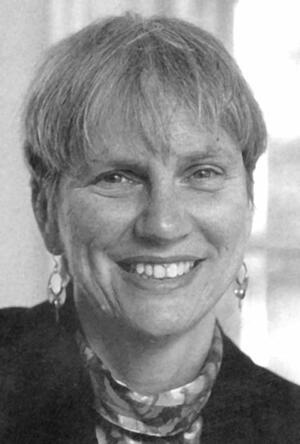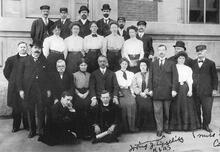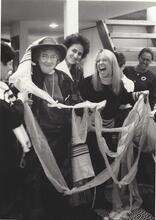Paula E. Hyman
Distinguished historian Paula Hyman challenged sacrosanct beliefs and stereotypes with vigor and knowledge and left behind a myriad of scholarly contributions and a profound vision for Jewish women. She was engaged deeply in Jewish feminism and wrote extensively on the history of Jewish women in an effort to integrate their experience into the Jewish historical narrative. Following From Dreyfus to Vichy: The Remaking of French Jewry, 1906–1939 (1979), her first historical study, she spent several years extending the field of French Jewish history, years later publishing a synthetic volume The Jews of Modern France (1998). Her profound involvement in the professional world was matched only by her commitment to family and Jewish communal affairs. She was involved in liberal political causes both in the Jewish community and in the larger American society.
Scholarship, feminism, dedication, perseverance, and integrity immediately come to mind when Paula Hyman’s name is mentioned. Those who knew her well would add family and friendship to the list. Though she ostensibly moved only from Boston, where she was born on September 30, 1946, to her last residence in New Haven, Connecticut, Hyman traveled wide and far, spiritually, intellectually, and physically. Hyman remained steadfast in her dedication to Jewish and humanitarian commitments and to her professional and personal concerns.
Family and Education
The oldest of three sisters, Paula was educated in a home where Jewish culture was an essential aspect of her upbringing, and so it remained throughout her own career. Her mother, Ida (Tatelman), the daughter of impoverished Russian immigrants, transferred her aspirations for education to her daughters while managing the household and working as a bookkeeper. Her father Sydney, the son of Lithuanian immigrants, worked as an office manager to support his family. Upon graduating from high school, Hyman studied at Radcliffe College, where she received her B.A. (summa cum laude) in 1968, having studied with a wide range of scholars in the Humanities, including two renowned mentors in Jewish history, Yosef Hayim Yerushalmi and Isadore Twersky. She acquired her knowledge of Hebrew and of classic Jewish texts from the Hebrew Teachers College of Boston (now Hebrew College), which she attended ten to thirteen hours a week in addition to regular high school and college. In 1966 she gained her B. J. Ed. there.
Hyman went on to Columbia University to do post-graduate work in history and completed her Ph.D. in 1975, after studying with distinguished medievalists Gerson D. Cohen and Zvi Ankori and prominent modern historians Robert O. Paxton and Ismar Schorsch. Hyman’s dissertation on the Jews in France after the Dreyfus Affair appeared with Columbia University Press under the title From Dreyfus to Vichy: The Remaking of French Jewry, 1906–1939 (1979), a work that immediately asserted her place among modern Jewish historians. Widely acclaimed and one of the finalists for the annual National Jewish Book Award in history, From Dreyfus to Vichy treated carefully and judiciously the different strands of French Jewry, granting special attention to the inter-war period and the dramatic transformation of the Jewish community, by virtue of the extensive immigration of Eastern European Jews.
Pioneering Jewish Women’s History
While still a graduate student, Hyman joined with two colleagues, Charlotte Baum and Sonya Michel, to publish a pioneering work on The Jewish Woman in America (1976) that gave pride of place to Hyman’s growing involvement in Jewish feminism, both on a scholarly and a personal level. In 1971 she had been one of the founders of Ezrat Nashim, a small feminist activist group that lobbied vigorously for the ordaining of women as Conservative rabbis, equality of women in Jewish religious and communal life, and their place and importance in the historical evolution of Jewish life in the past. The group submitted a petition, entitled “Jewish Women Call for Change,” to the Conservative Rabbinical Assembly on March 14, 1972. Hyman took great satisfaction in the attention The Jewish Woman in America received—she often remarked it was the only book she wrote for which she received fan mail—and the substantial impact of Ezrat Nashim, in particular the decision of The Jewish Theological Seminary to ordain women rabbis in 1983.
French Jewry and Jewish feminism were to remain at the center of Hyman’s intellectual and communal attention during the following decades. Her work on French Jewry in the modern period entered new directions with the publication of The Emancipation of the Jews of Alsace: Acculturation and Tradition in the Nineteenth Century (1991). Forever interested, academically and personally, in the ways in which Jews construct different forms of identity in a non-traditional society, Hyman inquired into the ways modernization impacted Jews in the Alsatian cities and countryside following emancipation. Sensitively employing the tools of a social historian, she looked at a wide range of sources to understand the behavioral patterns of “simple Jews” (e. g. peddlers, shopkeepers, cattle dealers). She concluded that they showed a greater ability to withstand the pressures of modernization than previously maintained with regard to city Jews. In this study she was also concerned with identifying how the process of modernization impacted the experience of Jewish women, and she successfully illuminated aspects of their ritual observance and economic involvement. Hyman’s move from the ideological problems that dominated her interest in From Dreyfus to Vichy to social ones in this study attested to her ability to address a wide range of social and cultural issues in equally professional quality. Her synthetic volume The Jews of Modern France (1998) was thus a natural outgrowth of these different interests and a product of her full command of the scholarship in modern French history and modern French Jewish history. Indeed, her perspective in this volume is grounded in her belief that French Jewish history highlights the evolution of French history while attesting to the struggle of a minority group to sustain itself in a highly centralized state system.
While pursuing these works, Hyman continued her deep engagement with the history of Jewish women and her efforts to integrate their experience into the broader Jewish historical narrative. Her 1980 article on the 1902 New York City kosher meat boycott offered a new understanding of Jewish women’s activism. She taught and lectured widely on Jewish women and published Gender and Assimilation in Modern Jewish History: The Roles and Representation of Women (1995), a book on the process of acculturation of women in America and Europe that developed from the distinguished Stroum Lectures. Considered by Deborah Dash Moore and Marion A. Kaplan to be “a book that set an agenda for a generation of scholars,” it treated gender as a crucial and much overlooked category in the study of history (Moore and Kaplan, 4). Two years later a Hebrew translation was published, for which the Hebrew word for “gender”—migdar—was created.
During these same years, Hyman and Moore undertook the editing of a two-volume historical encyclopedia Jewish Women in America, which appeared in 1997. This encyclopedia, which generated much enthusiasm among scholars and received several distinguished awards, could not have come to fruition without the tremendous dedication of the editors. Following that effort, Hyman published the memoirs of Puah Rakovsky (My Life as a Radical Jewish Woman: Memoirs of a Zionist Feminist in Poland, 2002), whose life story as a committed feminist and Zionist was very close to her heart. Rakovsky’s life had long engrossed her attention and inspired her. She later worked with ChaeRan Y. Freeze and Antony Polonsky to produce a volume of essays devoted to Jewish Women in Eastern Europe (Polin, 18 (2005). Indeed, like Puah, Hyman could not live a life without total engagement in these areas, as in others.
Academic and Communal Affairs
Hyman was always involved and active in academic and communal affairs while she pursued her career. After serving as assistant professor of history at Columbia (1974–1981), she became dean of the Seminary College of Jewish Studies, the first woman to hold the position, and associate professor of History at the Jewish Theological Seminary of America (1981–1986). In 1986 she became the Lucy Moses Professor of Modern Jewish History at Yale University, where she served for over a decade as chair of Jewish Studies, becoming the first woman to lead a major university’s Jewish Studies program. Deeply committed to the advancement of Jewish studies, she directed a large number of doctoral dissertations and gave herself unstintingly to a wide range of professional associations, bringing to all of them unfailing energy, exceptional insight, and unique dedication. In recognition of her contribution to Jewish scholarship and her leadership role, she received the Lifetime Achievement Award in Historical Studies in 2004 from the National Foundation for Jewish Culture and was elected President of the American Academy for Jewish Research, the first woman to serve in that capacity. She served as an active member of various editorial boards of leading research journals (e. g. YIVO Annual, Jewish Social Studies, AJS Review, Journal for the Feminist Study of Religion) and, with Deborah Dash Moore, edited Indiana University Press’s series on The Modern Jewish Experience for over two decades. She was awarded many distinguished prizes and awards, including honorary degrees from the Hebrew Union College (2002) and The Jewish Theological Seminary of America (2000). Among her last works was as co-editor, with Dalia Ofer, of Jewish Women: A Comprehensive Historical Encyclopedia.
A role model for many Jewish women, Hyman shared her dedication to and vision of Judaism with her husband Dr. Stanley Rosenbaum and their two daughters, Judith (b. 1973) and Adina (b. 1976). Her profound involvement in the professional world was matched only by her commitment to family and Jewish communal affairs. A committed progressive Zionist, Hyman regularly spent time in Israel, lecturing in Hebrew as well as English at the Hebrew University, Tel Aviv University, and Ben-Gurion University. She was involved in liberal political causes both in the Jewish community and in the larger American society. She also devoted significant time and attention to volunteer work in the academic world, the broader Jewish community, and her local Jewish community of New Haven, Connecticut.
Legacy
Hyman suffered from breast cancer and its metastasis for several decades, beginning at age 32. Never one to be stymied by adversity and difficulty, she continued to perform all her duties, commitments, and scholarship. Hyman was forthright and accomplished in all that she set out to do and made her impact in all her fields of endeavor, both personal and public. Several months before she died, Gender and Jewish History, a Festschrift in her honor, edited by her close colleagues Marion Kaplan and Deborah Dash Moore, appeared. It contains essays by teachers, colleagues, students, and by her daughter Judith.
Following Hyman’s death on December 15, 2011, many sensed that the role model for female scholars of Jewish history and Jewish women had left a legacy that they wished to pursue further. Gradually several projects emerged to keep that legacy alive and extend it into new areas. A mentorship program was created in her name, now run under the auspices of the Association of Jewish Studies (AJS); the AJS Women’s Caucus initiated a project in her memory to document its own history; and Yale University holds the Paula Hyman Memorial Lecture (endowed by Dr. Stanley Rosenbaum), that takes place bi-annually. Its inaugural lecture was delivered by Paula’s dear friend and colleague, Deborah Dash Moore, in 2013.
“My aim is to challenge,” Hyman wrote in Gender and Assimilation, and indeed she challenged sacrosanct beliefs and stereotypes with vigor and knowledge and left behind a myriad of scholarly contributions and a profound vision for Jewish women.
Selected Works by Paula E. Hyman
Books
The Jewish Woman in America, co-authored with Charlotte Baum and Sonya Michel. New York: Plume, 1976.
From Dreyfus to Vichy: The Remaking of French Jewry, 1906–1939. New York: Columbia University Press, 1979.
The Jewish Family: Myths and Reality, edited with Steven M. Cohen. New York: Holmes & Meier, 1986.
The Emancipation of the Jews of Alsace: Acculturation and Tradition in the Nineteenth Century. New Haven: Yale University Press, 1991,
Gender and Assimilation in Modern Jewish History: The Roles and Representation of Women. Seattle: University of Washington Press, 1995.
Jewish Women in America: An Historical Encyclopedia, co-edited with Deborah Dash Moore, 2 vols. New York: Routledge, 1997.
The Jews of Modern France. Berkeley and Los Angeles: University of California Press, 1998.
My Life as a Radical Jewish Woman: Memoirs of a Zionist Feminist in Poland, by Puah Rakovsky, edited with an introduction and notes. Bloomington: Indiana University Press, 2001.
Jewish Women in Eastern Europe, co-edited with ChaeRan Freeze and Antony Polonsky. Polin, Volume 18, 2005.
Articles
“Immigrant Women and Consumer Protest: The New York Kosher Meat Boycott of 1902.” American Jewish History (1980): 91–105.
“From City to Suburb: Temple Mishkan Tefila of Boston.” In The American Synagogue: A Sanctuary Transformed, edited by Jack Wertheimer, 85–105. Cambridge and New York: Cambridge University Press, 1987.
“The Modern Jewish Family: Image and Reality.” In The Jewish Family: Metaphor and Memory, edited by David Kraemer, 179-193. New York and Oxford: Oxford University Press, 1989.
“The Ideological Transformation of Modern Jewish Historiography.” In The State of Jewish Studies, edited by Shaye J. D. Cohen and Edward L. Greenstein, 143–157. Detroit: Wayne State University Press, 1990.
“The Dynamics of Social History.” Studies in Contemporary Jewry 10 (1994): 93–111.
“The Jewish Body Politic: Gendered Politics in the Early Twentieth Century.” Nashim 2 (1999): 37–51.
“National Contexts, East European Immigrants, and Jewish Identity: A Comparative Analysis.” In National Variations in Modern Jewish Identity, edited by Steven M. Cohen and Gabriel Horenczyk, 109–123. Albany: SUNY Press, 1999.
“The Transnational Experience of Jewish Women in Western and Central Europe after World War I.” In European Jews and Jewish Europeans between the Two World Wars, edited by Raya Cohen, 21–33. Tel Aviv: Tel Aviv University Press, 2004.
“Interpretive Contest: Art Critics and Jewish Historians.” In Text and Context: Essays in Modern Jewish History and Historiography in Honor of Ismar Schorsch, edited by Eli Lederhendler and Jack Wertheimer, 74–94. New York: Jewish Theological Seminary Press, 2005.
Moore, Deborah Dash and Marion A. Kaplan. “Introduction.” In Gender and Jewish History. Bloomington, IN: Indiana University Press, 2011.





